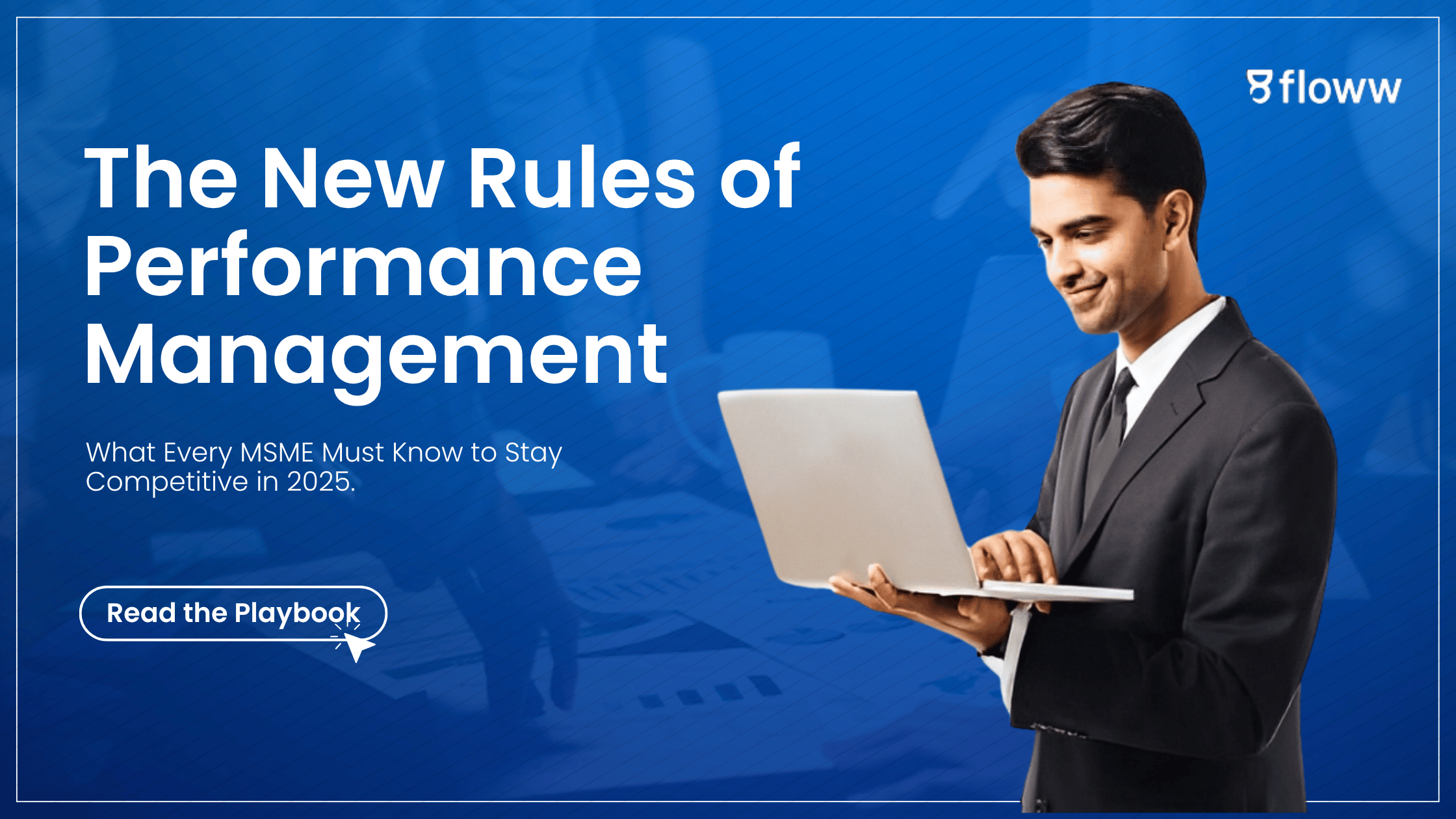The 2025 Performance Management Playbook: What MSME’s Need To Know Now
We’re entering an era where productivity and people's experience are more intertwined than ever. If you’re not actively managing performance, you’re actively mismanaging growth.

Let’s face it, performance management has long been the Achilles' heel of MSMEs. Sandwiched between chasing targets, managing lean teams, and keeping operations afloat, small and medium enterprises have often treated performance reviews as little more than an annual formality. But here’s the truth bomb for 2025: Performance management for MSMEs is no longer a “nice-to-have.” It’s now a strategic, make-or-break business imperative.
So, what does a future-ready performance framework look like for MSMEs? This 2025 playbook breaks it down. And there’s no fluff, just field-tested insights and practices that are driving real impact.
Why MSMEs Can’t Ignore Performance Management in 2025

According to a 2024 McKinsey SME pulse survey, 70% of MSMEs in emerging markets identify talent performance and productivity as their top three concerns, but only 24% have a structured system in place. That delta? That’s your competitive edge waiting to happen.
The problem is no longer awareness; it’s implementation. MSMEs often avoid investing in performance management systems, assuming they're too complex or too expensive. But in 2025, with lightweight tech, modular tools, and AI-driven insights, that excuse no longer holds water.
Here's the kicker: Performance management for MSMEs is not about copying enterprise strategies; it’s about tailoring agile, contextual systems that work for smaller teams and faster cycles.
The Human Shift: Performance is Personal Now
Gone are the days of one-size-fits-all Key Performance Indicators (KPIs) or generic 360-degree forms that felt like a ritual. Employees today expect feedback loops that are dynamic, fair, and rooted in growth not punishment.
A Deloitte report from Q1 2025 reveals that companies that replaced annual appraisals with monthly performance conversations saw a 23% increase in productivity and a 29% boost in employee retention. That’s not just feel-good HR data that’s ROI.
The most successful MSMEs are moving from:
- Review to Continuous Feedback
- Ranking to Coaching
- Ratings to Roadmaps
Why? Because the modern workforce, especially Gen Z and younger millennials who now make up over 60% of MSME teams in India (Statista, 2024), crave relevance, recognition, and regularity.
Performance Management Trends 2025: What’s Shaping the Game?

Let’s look at the emerging performance management trends for 2025 that MSMEs can’t afford to ignore:
1. Goal Alignment in Real-Time
In MSMEs, business objectives can change quarterly, sometimes monthly. Static annual goal sheets are now obsolete. The shift is towards dynamic goal setting, integrated with business dashboards. Tools like OKRs (Objectives and Key Results), once reserved for tech giants, are now being adapted into MSME-friendly templates via platforms like Atom HR, which let managers set, track, and tweak goals collaboratively in real time.
2. AI-Powered Performance Insights
You no longer need a full HR team to track performance anomalies or rising stars. AI-powered dashboards can now analyse behavioural patterns, project outcomes, feedback loops, and even tone of communication to provide early nudges.
3. Manager as Coach, Not Gatekeeper
Coaching-led management is fast becoming a trend that MSMEs are embracing due to flatter hierarchies. In 2025, expect to see micro-learning modules, real-time coaching feedback, and peer mentorship platforms embedded directly into performance systems.
Companies that implemented a coaching-first culture saw a 35% increase in team collaboration and a 40% drop in internal conflict, according to PeopleMatters SME Benchmark, 2024.
4. Personalized Growth Maps
Generic development plans are out. What works now are personalized learning journeys based on skill gaps, aspirations, and current roles. MSMEs are tapping into LMS-integrated performance tools, where each review connects to specific learning recommendations.
Imagine this: An underperforming sales rep gets tagged with a “negotiation skills booster pack” directly post-review. No bottlenecks, no hierarchy, just enablement.
Best Practices in Performance Management: MSME Edition
So, how do you actually apply this knowledge? Let’s break down some best practices in performance management that are working wonders for small businesses in 2025.
Simplify the Framework, Not the Impact
Forget the 14-page review templates. The new playbook is simple: What were the goals? What worked? What didn’t? How can we grow from here? MSMEs should adopt lightweight review structures that take no more than 30 minutes to complete but still offer depth. The key is consistency over complexity.
Make Feedback a Habit, Not an Event
Top-performing MSMEs have moved to a culture of “micro-feedback”- short, contextual notes shared weekly or bi-weekly. This keeps conversations fresh and corrective actions immediate. Use tools that allow this in-platform, like Atom Suite, instead of waiting for quarterly sit-downs.
Quantify Without Dehumanizing
Performance needs numbers but humans need context. Use metrics in conjunction with narratives, especially when evaluating subjective roles like design, strategy, or leadership. Example: Instead of saying “closed 80% of deals,” also say “built high-trust relationships in a new geography.”
Link Reviews to Recognition
This one’s underrated. Many MSMEs review but forget to reward. Recognition doesn’t always mean bonuses. It could be public appreciation, fast-tracked responsibilities, or a shoutout in town halls.
In 2025, recognition tied to reviews has become a proven motivator, improving retention by 21% (LinkedIn Talent Trends, 2025).
Common Pitfalls to Avoid in 2025

Let’s not sugarcoat it, there are landmines. And here’s exactly what can be avoided-
- Over-relying on automation: AI can assist, but managers still need to interpret with empathy.
- Inconsistent reviewer training: If different managers review with different standards, the system breaks.
- No follow-through: A performance review without next steps is just corporate theatre.
The antidote? A system that is transparent, tech-enabled, and tactically human. And that is why we have the Atom Suite.
Real MSMEs, Real Wins
Case in point: A mid-sized D2C brand in Bangalore with 90 employees shifted to a continuous review system using Atom HR in mid-2024. In just 6 months, they reported:
- 2x faster project cycles
- 30% improvement in manager-reportee trust
- 18% boost in NPS from employees
Their secret? Integrated goal tracking, bi-weekly check-ins, and peer-led feedback. Not a dime spent on fancy consulting, just smart tools and smarter intent.
Small Teams But Big Performance
In 2025, performance management is no longer about “appraising” employees. It’s about activating potential. For MSMEs, this is the year to stop reacting and start leading. You don’t need to mimic Fortune 500 frameworks. You need your own agile, people-first performance playbook. One that scales with you, adapts with you, and grows your people as fast as your profits. Because at the end of the day, systems don’t build businesses, people do.
Looking Ahead: The Role of Platforms Like Atom Suite
If you’re wondering how to translate these insights into action, platforms like Atom HR from Atom Suite are already ahead of the curve. Designed specifically for MSMEs, Atom HR integrates real-time goal tracking, AI-powered feedback prompts, review templates tailored to different roles, and learning paths triggered by performance gaps.
It’s not HR software, it’s your performance partner.
The smartest strategy is investing in the right tool that will get you there.
Read More: The MSME Guide To Email Clarity
Read More: Top 10 Reasons Why You Should Use Atom Mail To Close Deals Faster

